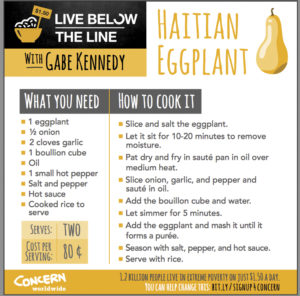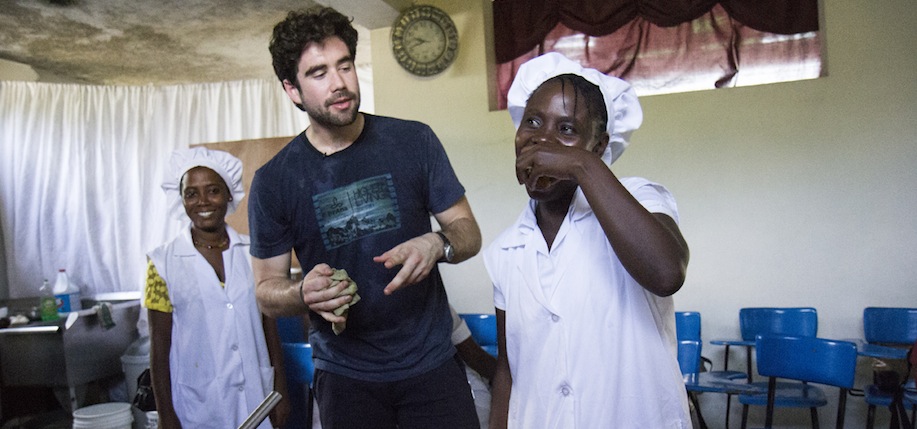Gabe Kennedy speaks here with R. Bryan Willits about teaching the basics of cooking in Haiti and the power of food as “a catalyst for change.”
Aside from his indisputable culinary prowess, Gabe Kennedy often uses his fame as a platform to promote the idea of having a more mindful relationship with the things we eat.
Kennedy, age 24, was raised in Boulder, Colorado, in a family of healers – his father is a chiropractor, and his mother an acupuncturist. Ideas about Chinese herbal medicine and the curative powers of food abounded in the Kennedy home, and he recalls being lucky enough to travel extensively when he was young, discovering early on that no matter where he was he could always connect with people of different cultures through cooking. For him, food was a universal language.
He worked in restaurants from age 14 through high school. Upon graduating, he went straight to the Culinary Institute of America, where he emerged at the top of his class with multiple awards. From there, he attended the Cornell University School of Hotel Administration, where he sharpened his business acumen and found his entrepreneurial spirit.
After graduating from Cornell, on top of starting a popcorn company and his own catering service, Kennedy worked for a restaurant consulting group, and later for a private equity group that invested in organic brands. Shortly thereafter, he became the most successful contestant on ABC’s The Taste, just before joining forces with the Irish relief organization Concern Worldwide and Live Below the Line, an organization that seeks to raise funds and awareness for the 1.2 billion people who live below the line of extreme poverty, by challenging people to live on less than $1.50 a day.
Part of Concern’s strategy is to develop self-sustaining programs and infrastructure in the communities they serve, and in line with this, they made Kennedy an ambassador to Haiti, where 77 percent of the people live below the poverty line. There, at a small culinary school with no running water and a stove that is lit by a match, Kennedy taught a basic skills class, learned what it was like to cook a meal for a group of people who could spend just 50 cents a head, and got to experience some of Haiti’s national dishes his students made for him.
I recently spoke with Kennedy about his food philosophies, his experience with Concern, and his belief that we can use food as a means to heal not only people, but the planet that sustains us.
℘℘℘
What did you take away from being on The Taste?
I think the biggest thing I learned from that show was really the power of focus, the power of commitment, and the power of intention. It was just something that I felt so deeply dedicated to doing well at. It was really powerful, and from there it just opened my world. It’s allowed me to explore and to be myself, to challenge myself and to be involved in a self-starting process that has been, quite frankly, a dream come true. I am so deeply grateful and humbled and in awe at the course of how this has all progressed over the last few months. But it’s all coming down to asking, “where can I make a difference?”
Now I see that perhaps the biggest impact I can make is by sharing my viewpoint, by being someone who will advocate for doing things that are going to make people and the planet healthier. I’m fortunate enough to have some opportunity to do so, hopefully through media and engaging with impactful projects, and by using food as a catalyst for positive change.
So what is it exactly that you advocate?
I want people to discover – or rediscover – the joy of nourishing themselves and nourishing people that they love.
We have to be involved in the process of cooking – wash the dirt off the vegetables – treat it as a practice. You really need to take some time to nourish yourself and to have a connection with your food, because it’s a really intimate thing. It goes into your body, and we know that food is an integral part of our existence. Unfortunately, I feel that people are becoming more and more disconnected from their food – where it comes from, the story that it tells, and the implications and ramifications of their purchasing power.
If I can get people into the kitchen and to start cooking with whole foods, perhaps that’s a great entrance into making a difference for both those people and the planet. I’m never going to tell someone what to eat, but I do want to get people to start thinking about their food in a new way, to have a relationship with it. Only when you start having a relationship with your food – or with anything in your life, really – can you understand it and decide what systems you want to support.
How did your work with Concern and your time in Haiti impact your thinking?
Well, I’m cooking from a place of privilege 99 percent of the time. If I’m shopping for myself I usually will buy organic, or I go out and I shop for clients, buy whatever I want, and make a delicious meal, but then maybe some of it gets thrown out. That’s not real life for most people, and going to Haiti really made me look at food in a different way – not using food and creativity from a point of endless expression or endless opportunity, but creatively within some pretty serious restrictions and confines. That’s a whole different exercise to go through as a chef, but also as a person.
Going to Haiti, I was really shocked. I was expecting to see poverty, but I wasn’t expecting poverty on that level. I was expecting to see poor people, but I wasn’t expecting every single person to be really poor.

Poverty doesn’t mean that you just don’t have money. Poverty means that you don’t have access; you don’t have education. You’re poor in opportunity, you’re poor in education, and you’re poor in environment and lifestyle. It’s not just a financial thing. It’s a really large, complicated system that needs to be addressed if we want to make a difference. I was also deeply humbled by the positive attitudes of the people. There is this underlying feeling of somberness, but you also did have these moments of profound hope and acceptance and perseverance that were truly inspiring.
Do you think Concern’s work and the cooking school you were teaching at will have a positive impact?
I think it already is effective and that it’s making a difference for a small number of people now, but hopefully that can grow. I think that the people in Haiti are trying to do some really incredible things, and I think that school is one of them. Being able to take disenfranchised people, and equip them with skills that can truly make a difference in their lives – and using food as a catalyst for positive change. It’s really beautiful.
A lot of what is truly going to change the world is that everyone has to take it onto themselves to do what they can to make a difference. It means doing what you can, even if that is educating nine women at a time. And it isn’t only that one cooking school. There’s a tourism project, and they’re building bed-and-breakfasts in this community. They are creating community centers and a tourism center at the top of a waterfall, building a swimming pool and a little relaxation area, trying to focus on restaurants.
It’s a huge undertaking, and that’s why it was so inspiring to work with Concern. They look at a community and see what it needs and then go from there. To me that’s a smart way of doing it, it’s the most impactful way of doing it, and it’s the most interesting way of doing it. I was really fortunate to be able to witness that and be involved in it. Hopefully I was able to contribute.
Drawing on your experiences in the food industry and with Concern, what message do you have for the rest of the world?
It comes down to staying curious and being mindful. I want people to ask a few questions about where food comes from, to acknowledge the beauty in it, and I think that’s the entrance into making better decisions about how you nourish yourself. When I look at food, I just think it’s so magical. Look at a corncob or a sugar snap pea – the whole universe is in that. Take a moment and think about what all this has gone through before it goes into your body.
If I wanted to give a cooking message, it would be to follow your intuition – make it your own – have a relationship with it, and don’t be afraid to try things and fail. ♦


What a concept. It leaves me with a feeling of hope.I feel Mr. Kennedy is right on in his assessment of the intimacy of food & its ability to be a catalyst for uplifting people & the planet. I applaud him & the efforts of Concern.